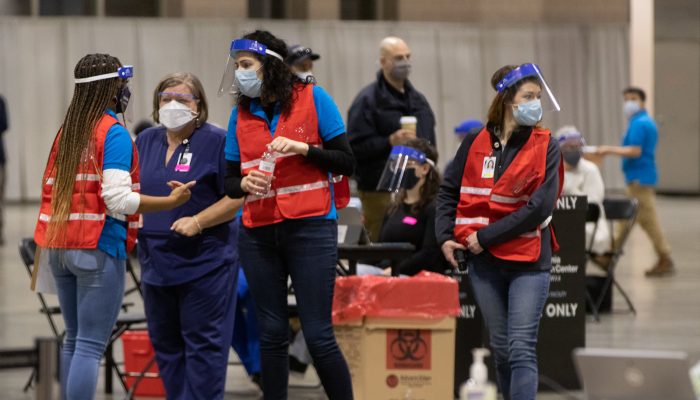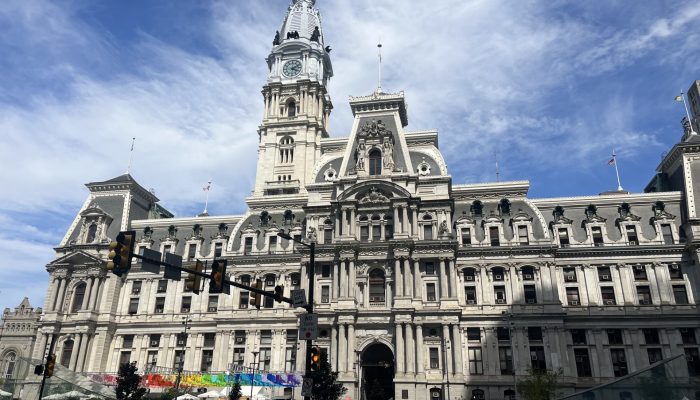The lifesaving promise of the approved COVID-19 vaccines is precisely why they’re so sought after.
As a result, the Centers for Disease Control and Prevention (CDC), Pennsylvania state health officials, and the Health Department here in Philadelphia have outlined their guidelines as to which groups of people receive the first batches of vaccines. Each of these waves of eligibility are called phases; right now, we’re in Phase 1b.
This blog explains what you need to know about the COVID-19 vaccines and people living with HIV (PLWH).
People living with HIV are now considered a priority group in Phase 1b.
As of today, PLWH are a priority group eligible to receive a COVID-19 vaccine. This means that if you live with HIV, you are able to go to a vaccine distribution event or a provider who has the vaccine and, so long as supplies allow, get vaccinated.
City directives are and have always been aligned with CDC and Pennsylvania Department of Health guidance.
With the guidelines, each local community may expand CDC categories to address their unique needs. Initially, CDC’s guidance for Phase 1b groups included only those over age 75 and frontline essential workers.
Revised in December 2020, the CDC’s guidelines now include people ages 16-64 with underlying medical conditions putting them at greater risk in Phase 1b. The Health Department determined Philadelphia’s COVID-19 vaccine prioritization groups based upon recommendations of the CDC’s Advisory Committee on Immunization Practices (ACIP). Then, using input from the COVID-19 Vaccine Advisory Committee, the Health Department fine-tuned these recommendations for application in Philadelphia.
Philadelphia did not initially include HIV-positive status as an underlying medical condition that increases the risk of complications. We do now.
We made this change as the result of recommendations from the community and daily analysis of new information.
It’s true the Health Department, upon receiving new information and insight and recommendations from the Vaccine Advisory Committee, changed its position to now include all PLWH in Phase 1b.
The nature of modern HIV treatment – it gives PLWH a typical lifespan and if they successfully reach viral suppression or become “undetectable,” they are unable to transmit HIV to sex partners – along with the fact that many PLWH are not immunocompromised, is why we initially did not consider all PLWH to be eligible in Phase 1b. Plus, PLWH – a diverse group of people that engage in different behaviors, have different occupations, and live in different housing arrangements – aren’t a monolith.
This change is necessary to reduce health disparities and minimize the number of COVID-19 deaths.
It’s a matter of equity in public health practice to avoid sustaining disparities in vaccine distribution. The vast majority, about 80 percent, of PLWH in Philadelphia are Black or Hispanic. Black and Hispanic Philadelphians are at much higher risk dying from COVID-19.
Equity in public health practice is rooted in data and science: If you follow the data, you find that the groups hardest hit by COVID-19 are also hardest hit by HIV. We maximize our impact by dynamically allocating our resources.
Many Philadelphians living with HIV were already eligible to receive vaccines.
It’s important to note that even before this change, many PLWH were already at greater risk from COVID-19. Despite treatment being free to all regardless of ability to pay, only about half of all PLWH in Philadelphia are on HIV treatment and virally suppressed. This figure includes people who are unaware of their status.
Of course, everything written about HIV treatment here only applies to those actually receiving treatment. Those not connected to treatment or virally suppressed are all likely immunocompromised.
Prior to our addition of all PLWH into 1b, our guidelines stated that non-healthcare frontline, essential workers and those at highest risk who receive certain health or community-based services were eligible.
This would put many, if not most, PLWH in Philadelphia in Phase 1b even before this change. Likewise, if a PLWH is a medical professional or lives in a long-term care facility, they would have been eligible from the start.
Being eligible for a vaccine does not mean you’re guaranteed to receive one.
Nationwide, supply is not meeting demand.
If your HIV care provider contacts you, do not delay in getting back to them. Coordinate with them immediately.
Before going to a vaccine event, call your HIV medical care provider first to see if they have supplies of the vaccine on hand and, if so, how you can obtain them.
You should also add your name to the Health Department’s vaccine interest form available online. The City notifies those who sign up when and where they can receive their vaccine and provides help scheduling an appointment.
The approved vaccines are safe and effective.
The U.S. Food and Drug Administration (FDA) safeguards the nation’s prescription drugs, including vaccines. Initially, the FDA issued emergency use authorization in late 2020 to two vaccines, one from Moderna Pharmaceuticals and another from Pfizer, that are 94 percent and 95 percent effective, respectively, according to the CDC. This does not necessarily mean that over 90 percent of people getting the vaccine will never get COVID-19. Rather, it means that the vaccine prevents moderate or severe illness from COVID-19, including death, in over 90 percent of the people who receive it.
Other COVID-19 vaccines show comparable promise as regulators continue to analyze them.
While it does appear that the vaccines do, in some measure, prevent transmission and acquisition of the virus, whether or not someone can acquire and transmit the virus without symptoms after being vaccinated is a question we still don’t have enough research into yet. This is partly why even though some people get the vaccine, they still need to wear a mask when out in public.
We do not believe that vaccine confidence is the primary problem facing Philadelphia. Rather, it is a lack of supply nationwide.
The vaccines appear to be safe and effective for people living with HIV, too.
It’s a mistake to think that people living with HIV were not included in vaccine trials. They were.
Although historically researchers frequently excluded PLWH from some clinical trials, that is not true for the COVID-19 vaccine efforts. Moderna, Pfizer, AstraZeneca, Johnson & Johnson, Novavax, and GlaxoSmithKline all have PLWH participating.
To be sure, the CDC still considers there to be “limited safety data” pertaining to the COVID-19 trials and PLWH. But, for instance, in the Moderna vaccine study, 176 participants were PLWH. None of the PLWH who received the vaccine acquired COVID-19. No safety concerns arose from the entire group.
Out of an abundance of caution, anyone, regardless of HIV status, receiving the vaccine is asked to sit 15 minutes afterward to ensure they are not experiencing a serious allergic reaction or similar condition.
If you are a person living with HIV not currently in medical care, you should connect to a medical provider.
If you are living with HIV and need help finding a medical provider, please call the Health Information Helpline at 215-985-2437 or email health.csu@phila.gov and we will connect you to a medical provider; you can also find a list of medical providers on the City’s website.
We can also see if you are eligible to receive medical case management services, that, just like HIV medical care, is free to all regardless of ability to pay.
This is a critically important action.
Many people living with HIV who already received the COVID vaccine found out because their medical provider contacted them directly. Connecting to a medical provider also makes it easier to obtain and adhere to treatments that both extend life and prevent transmission of HIV to sex partners.
If you are not sure what your HIV status is, or if you are interested in obtaining PrEP, the treatment that prevents HIV, please visit PhillyKeepOnLoving.com to find a nearby testing site, order a home test kit, and find other information.



